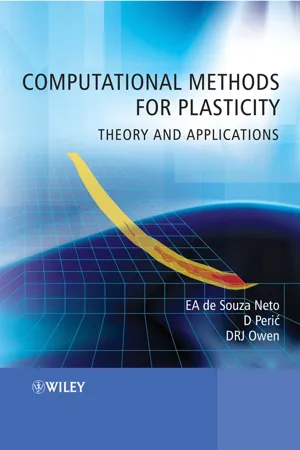
Computational Methods for Plasticity
Theory and Applications
- English
- ePUB (mobile friendly)
- Available on iOS & Android
Computational Methods for Plasticity
Theory and Applications
About this book
The subject of computational plasticity encapsulates the numerical methods used for the finite element simulation of the behaviour of a wide range of engineering materials considered to be plastic – i.e. those that undergo a permanent change of shape in response to an applied force. Computational Methods for Plasticity: Theory and Applications describes the theory of the associated numerical methods for the simulation of a wide range of plastic engineering materials; from the simplest infinitesimal plasticity theory to more complex damage mechanics and finite strain crystal plasticity models. It is split into three parts - basic concepts, small strains and large strains. Beginning with elementary theory and progressing to advanced, complex theory and computer implementation, it is suitable for use at both introductory and advanced levels. The book:
- Offers a self-contained text that allows the reader to learn computational plasticity theory and its implementation from one volume.
- Includes many numerical examples that illustrate the application of the methodologies described.
- Provides introductory material on related disciplines and procedures such as tensor analysis, continuum mechanics and finite elements for non-linear solid mechanics.
- Is accompanied by purpose-developed finite element software that illustrates many of the techniques discussed in the text, downloadable from the book's companion website.
This comprehensive text will appeal to postgraduate and graduate students of civil, mechanical, aerospace and materials engineering as well as applied mathematics and courses with computational mechanics components. It will also be of interest to research engineers, scientists and software developers working in the field of computational solid mechanics.
Tools to learn more effectively

Saving Books

Keyword Search

Annotating Text

Listen to it instead
Information
Table of contents
- Cover
- Title page
- Copyright
- Dedication
- Preface
- Part One: Basic concepts
- Part Two: Small strains
- Part Three: Large strains
- Appendices
- References
- Index
Frequently asked questions
- Essential is ideal for learners and professionals who enjoy exploring a wide range of subjects. Access the Essential Library with 800,000+ trusted titles and best-sellers across business, personal growth, and the humanities. Includes unlimited reading time and Standard Read Aloud voice.
- Complete: Perfect for advanced learners and researchers needing full, unrestricted access. Unlock 1.4M+ books across hundreds of subjects, including academic and specialized titles. The Complete Plan also includes advanced features like Premium Read Aloud and Research Assistant.
Please note we cannot support devices running on iOS 13 and Android 7 or earlier. Learn more about using the app